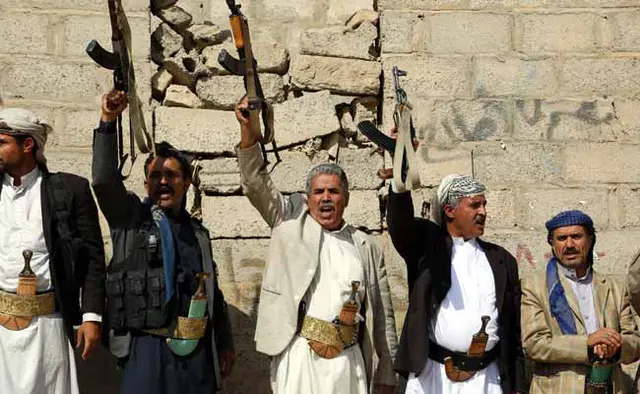The cease-fire in Yemen, commenced at midnight Sunday, is teetering amid violations from all warring parties, including the Saudi-led Arab coalition.
In the southern province of Taiz, local people said the Shiite Houthis are shelling areas with rockets, coinciding with a statement by the provincial resistance military council that 12 breaches by the militia were documented in the first hour of the truce.
In what appeared to be a response to Houthi violations, the Saudi-led coalition carried out air strikes in Taiz and Sanaa, locals said.
Observers argued that no cease-fire will succeed until foreign powers that have proxies in Yemen agree or hold talks about it, referring to Saudi Arabia and Iran.
Ahmed Al-Jabr, a writer and analyst, said other reasons for the disrespect of the truce include absence of direct UN supervision and inaction against those involved in breaches of previous cease- fires.
"It was expected for the truce to fail as it began without real measures to build trust among the warring factions," he said, while affirming that only Saudi Arabia and Iran can help solve this persistent problem.
There have been three pauses since the military escalation started more than a year ago. All of them failed while humanitarian situation deteriorates.
Meanwhile, the truce is supposed to pave the way for a new round of peace talks in Kuwait later this month, about which the observers are not optimistic.
Yaseen Al-Tamimi, a political writer and analyst, said some factions do not believe in peace and that's why they usually take advantage of cease-fire to take a breath and rearrange their figting strategies.
"Such factions don't have peaceful projects that should be based on partnership and putting the country's interest above anything else," Al-Tamimi said.
Nabil Albukiri, a researcher, said the Houthis are not seeking peace with regard to the civil war in the Arab country and all they are concerned about is a truce with Saudi Arabia in the border regions.
"The truce on the border gives them a chance to intensify their internal war. And besides, the peace process in Yemen depends on success of military goals of each party," Albukiri said.
"All parties count on military decisiveness and it could be that the truce comes under pressure by the UN and international community but real intention for truce is lacking from all sides," Albukiri added.
Observers also said the situation in Yemen, either chaos or peace, is highly relative to the regional situation.
"There is a persistent political uncertainty since the so-called Arab Spring erupted years ago, which cast a cloud on the peace process in each regional country," Albukiri said.
Humantarian disaster
The UN says around 82 percent of Yemen's population, 21 million, need basic aid, 19 million lack access to drinking water and 14 million lack access to healthcare. Also, the conflict has displaced around 2.5 million people and left around two million children suffering from malnutrition.The war has paralyzed almost all services, while
the Saudi-led coalition's blockade on Yemen has deepened the suffering. The blockade has deprived Yemen of all necessary supplies and almost all hospitals and businesses have been forced to close.
The situation has been getting worse day in and day out. Relief organizations have reiterated the importance of adherence to the cease-fire.
This last year of escalated violence has meant that on each given day, around 25 civilians are killed or injured and around 6610 more were forced to flee their homes. A statement by some agencies said a school or health facility has been attacked every three days.
The number of kids who died each day from preventable diseases has risen to 137, 28 more before the start of the war. More than 82 percent of Yemenis, or 21.2 million, now depend on humanitarian aid, it added. Enditem
 简体中文
简体中文

